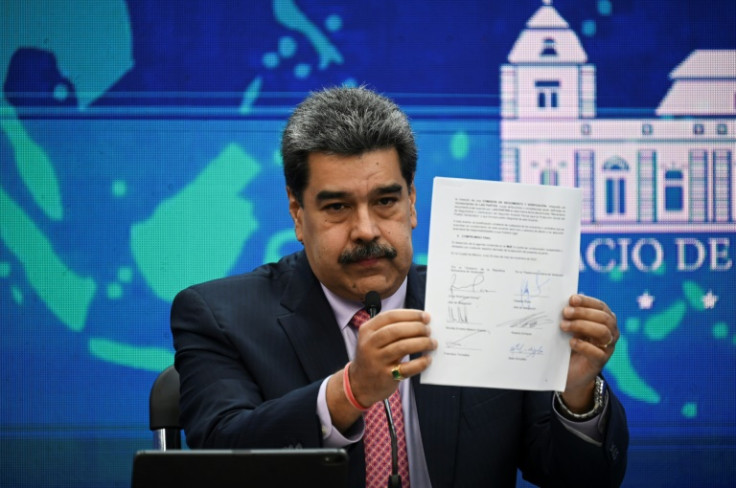
Venezuela's government and opposition said Monday they will restart talks seeking to end the country's political and economic crisis, after a nearly year-long suspension.
In a joint statement, the two sides said that the Norway-facilitated negotiations will resume Tuesday in Bridgetown, Barbados, with participation of the United States -- the destination for millions of Venezuelans who have fled economic hardship at home.
The opposition, backed by several countries including the United States, did not recognize President Nicolas Maduro's 2018 re-election in a vote widely dismissed as fraudulent.
The following year, Washington ramped up sanctions against Caracas first imposed in 2015 over the brutal repression of anti-government protests.
On Monday, the United States welcomed the announcement of fresh talks.
"Along with likeminded partners and other friends of Venezuela, the United States will continue its efforts to unite the international community in support of the Venezuelan-led negotiation process," US State Department spokesman Matthew Miller said.
Talks seeking to end the impasse began in August 2021 but were suspended in October after the extradition to the United States of businessman Alex Saab, a Colombian national accused of acting as a money launderer for Venezuela's socialist leader.
The negotiations briefly resumed but in November 2022 there was a new break after the government said continued dialogue was conditional on the release of $3 billion in frozen funds abroad.
The opposition, for its part, wants guarantees for free and fair elections next year.
In March, a Venezuelan official said free presidential elections in 2024 were dependent on the lifting of sanctions by the United States and European Union.
Observers hope the Barbados talks will yield an agreement through which, in exchange for sanctions easing, an election timetable will be drawn up for 2024 and the opposition allowed to hold primary elections later this month.
They also hope it will yield the release of political prisoners and the lifting of political disqualifications of presidential candidates.
The energy crisis sparked by Russia's war on Ukraine saw global efforts renewed to solve the crisis in Venezuela, which has the world's largest oil reserves.
Last year, US delegates went to Caracas to meet Maduro, event though it does not recognize him as a legitimate leader.
After talks initially resumed between the government in Caracas and the opposition, Washington granted a six-month license to US energy giant Chevron to operate in Venezuela and has voiced a willingness to ease sanctions further in return for progress.
Earlier this month, the two countries struck a deal under which Venezuela would accept back nationals deported from the United States after arriving there illegally.
Oil prices fell Monday on the promise of a prospective deal loosening sanctions on Venezuelan crude exports.
According to state-owned broadcaster Voice of America, American diplomats planned to travel to Barbados to meet representatives of both delegations.
"The United States is interested in normalizing relations a little, not so much for political reasons, but rather for the benefit of its national interest, which is absolutely economic," Venezuelan political consultant Pablo Quintero told AFP.




